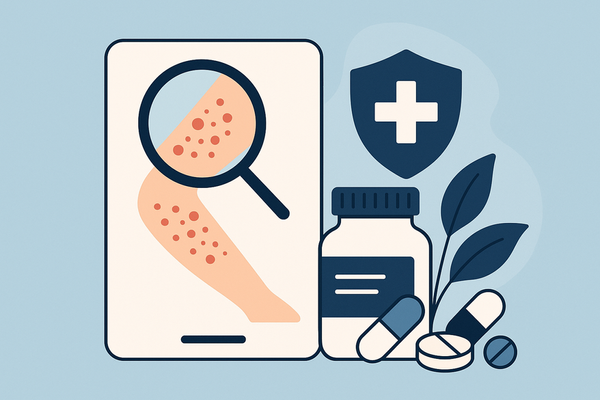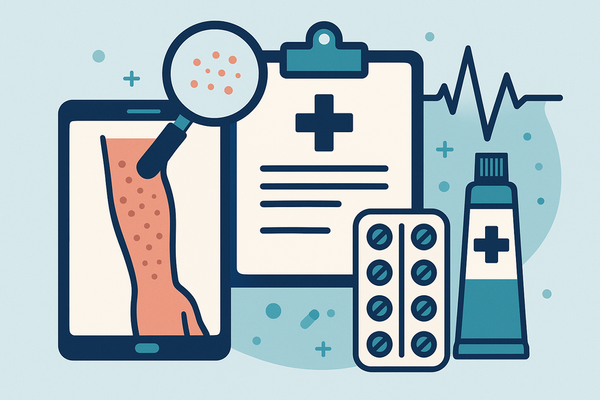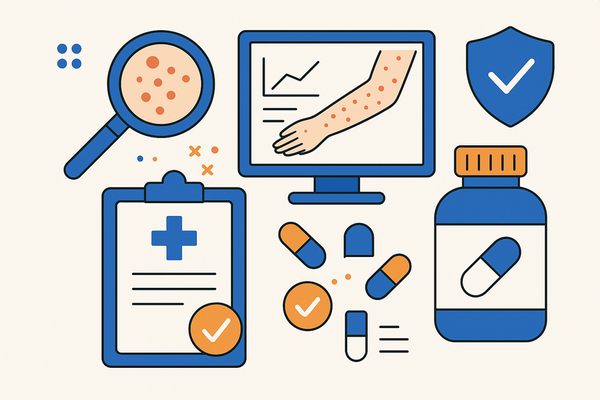Understanding the Connection Between Mental Health and Skin Conditions
Explore the link between mental health and skin conditions, learn holistic care strategies, and discover how treating both leads to improved health.
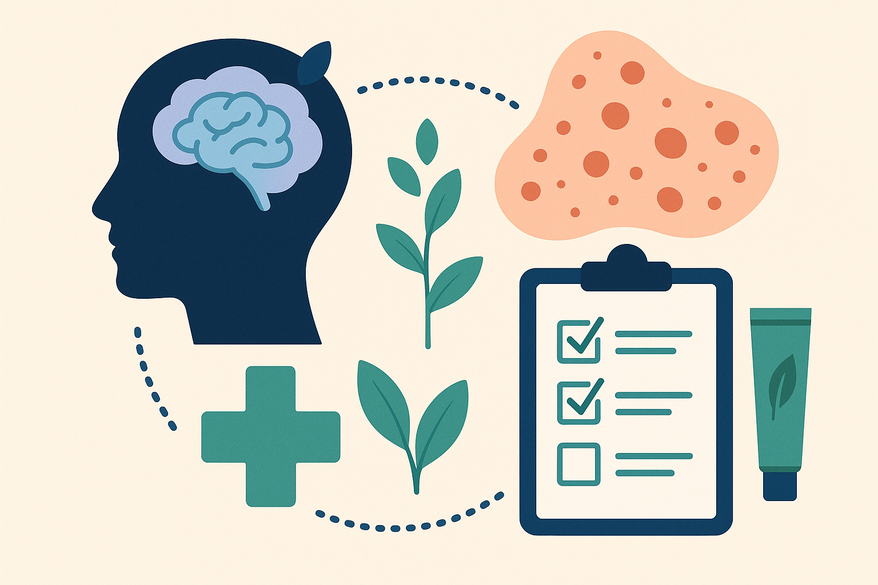
Estimated reading time: 8 minutes
Key Takeaways
- Mind and skin are interconnected: Stress hormones can trigger or worsen acne, eczema, psoriasis, and hives.
- Skin conditions affect mental health: Visible flare-ups can lower self-esteem, fuel anxiety, and lead to social withdrawal.
- Integrated care works best: Combining dermatology and mental health treatments speeds healing and improves long-term outcomes.
- Lifestyle and mind-body strategies: Meditation, balanced diet, adequate sleep, CBT, and professional guidance support both skin and mood.
- Practical resources: Psychodermatology clinics and apps like Rash Detector can monitor progress.
Table of Contents
- Understanding Mental Health
- Basics of Skin Conditions
- The Connection Between Mental Health and Skin Conditions
- Impact of Skin Conditions on Mental Health
- Research and Expert Insights on Integrated Care
- Strategies for Managing Mental Health and Skin Conditions
- Conclusion
- FAQ
Understanding Mental Health
Mental health shapes how we think, feel, and act. It influences mood, focus, and social interactions. Key elements include:
- Common issues:
- Depression: prolonged sadness or low mood
- Anxiety disorders: chronic worry or fear
- Stress-related disorders: difficulty coping with changes
- Symptoms:
- Mood swings or persistent sadness
- Concentration problems or indecision
- Sleep disturbances—insomnia or oversleeping
- Social withdrawal
- Influencing factors:
- Genetic predisposition
- Environment: home, school, work
- Support networks and coping skills
- Major life events (loss, change)
Real-world note: A patient under heavy work stress may see acne breakouts or eczema flair-ups while feeling hopeless or restless. This highlights the mind-skin link in action. To learn about how sleep quality influences skin repair, see sleep quality influences skin repair.
Sources:
Basics of Skin Conditions
Skin conditions involve changes in appearance or function—ranging from mild to chronic. Common examples:
- Eczema (atopic dermatitis): red, itchy patches
- Psoriasis: thick, scaly plaques
- Acne: whiteheads, blackheads, pimples
- Vitiligo: pigment loss
- Hives (urticaria): itchy, raised welts
Key causes:
- Genetic predisposition
- Hormonal changes (puberty, pregnancy)
- Immune system imbalance
- Environmental triggers (allergens, irritants)
- Lifestyle factors: diet, sleep, hygiene
Example: A teenager on a high-sugar diet may experience more acne. When stressed about exams, flare-ups often worsen.
Sources:
- American Psychiatric Association blog
- PMC article on psychodermatology
- American Family Physician overview
The Connection Between Mental Health and Skin Conditions
Psychodermatology examines how the brain, nerves, and skin communicate via the neuro-immuno-cutaneous system (NICS):
- Nerves relay chemical signals to immune cells
- Immune cells influence skin cell behavior
- Stress hormones (cortisol) fuel inflammation and weaken the barrier
Stress and flare-ups:
- Cortisol dilates blood vessels, causing redness
- Barrier damage lets irritants in, prompting itchiness
- Inflammatory mediators exacerbate psoriasis, eczema, hives
Case snapshot: Social anxiety may trigger nail-biting or skin-picking. Repeated minor wounds can become infected or scar, showing how anxiety both initiates and worsens skin issues.
Sources:
Impact of Skin Conditions on Mental Health
Visible skin issues can lead to shame and self-criticism, causing:
- Low self-esteem and negative body image
- Fear of judgment at work or social events
- Withdrawal from public or social gatherings
These reactions may trigger:
- Depression from persistent self-doubt
- Heightened anxiety in crowds or classrooms
- Reduced quality of life due to appearance worries
Vulnerable groups:
- Teens sensitive to peer perceptions
- High-stress professionals
- Anyone lacking strong social support
Sources:
Research and Expert Insights on Integrated Care
Key findings:
- Up to one-third of dermatology patients report serious psychological distress.
- As many as 84% with chronic skin issues experience mental health symptoms.
Highlights:
- Mental stress delays wound and psoriasis plaque healing.
- Treating depression or anxiety often improves acne and atopic dermatitis.
- Dermatologist-psychiatrist collaborations yield faster, more lasting results.
Expert tip: Clinics offering both talk therapy and skin treatments help patients adhere to plans, addressing mind and skin simultaneously.
Sources:
Strategies for Managing Mental Health and Skin Conditions
- Lifestyle Modifications
- Daily stress relief: meditation, deep breathing, yoga
- Balanced diet with lean proteins, vegetables, whole grains
- Consistent sleep schedule: 7–9 hours nightly
- Mind-Body Therapies
- Cognitive-Behavioral Therapy (CBT) for negative thoughts
- Mindfulness exercises for calm presence
- Progressive muscle relaxation or guided imagery
- Medical Treatments
- Dermatology: topical creams, light therapy, oral meds
- Psychiatry: antidepressants or anti-anxiety medicines
- Combined protocols: enhanced results when stress is managed
- Professional Guidance
- Dermatologist consultation for persistent skin issues
- Psychologist or psychiatrist for mood, anxiety, or withdrawal
- Inquire about psychodermatology or integrated care clinics
- Holistic Approach
- Build a multidisciplinary care team
- Track skin symptoms and mood in a daily journal
- Adjust care plans with changing needs or seasons
- Explore holistic management strategies
Every step to calm your mind can help your skin heal—and improving your skin can lift your spirits.
For instant rash monitoring and personalized insight, use the Skin Analysis App Rash Detector to upload photos and get an AI-generated report in seconds.
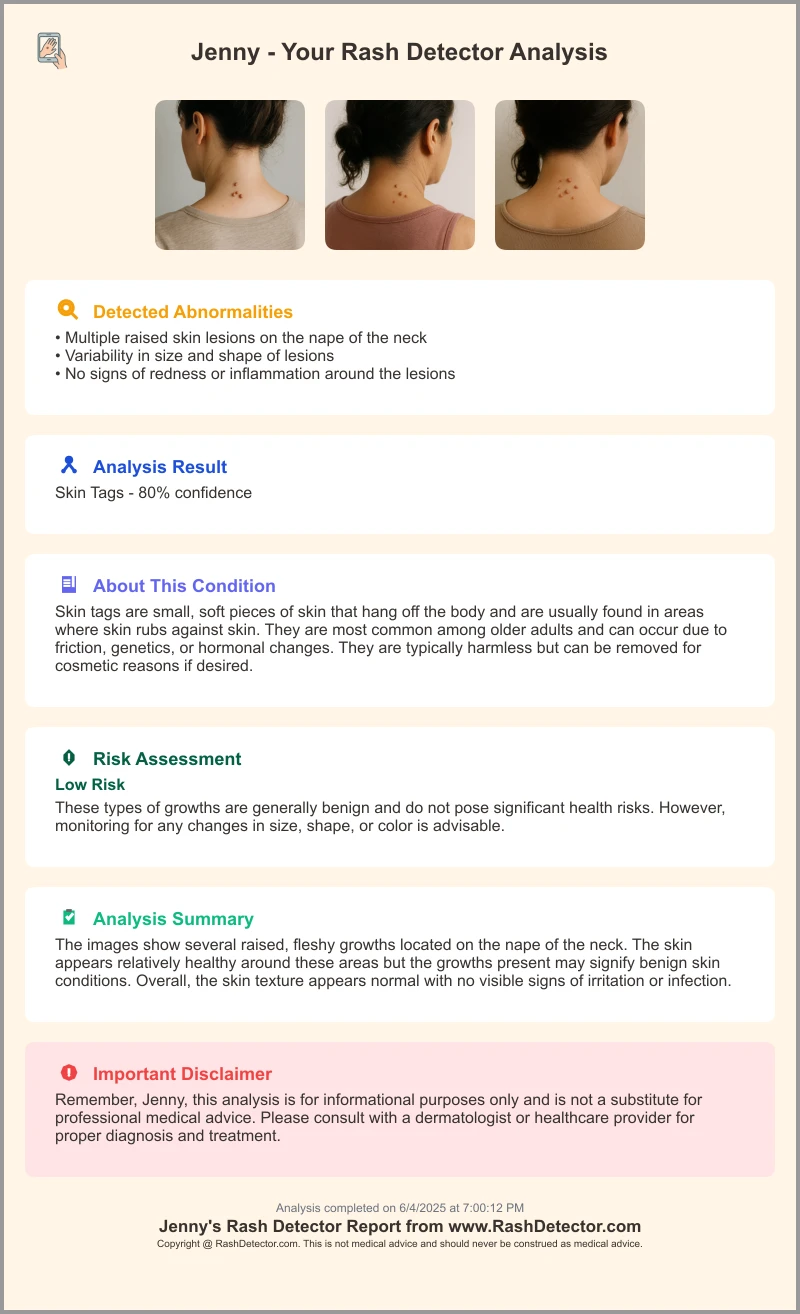
Conclusion
Mental health and skin conditions are deeply intertwined. Stress and anxiety trigger rashes and acne; visible skin issues erode self-esteem and may spark depression. Studies show combined mental health and dermatology care offers the best outcomes. To embrace holistic wellness:
- Employ stress management and mind-body tools
- Follow prescribed skin care and mental health treatments
- Seek integrated or psychodermatology care when needed
By nurturing both mind and skin, you strengthen overall well-being and promote healthier, brighter days—and complexions.
FAQ
- What is psychodermatology?
A field studying the interaction between psychological processes and skin health through the neuro-immuno-cutaneous system. - How does stress worsen skin conditions?
Stress hormones like cortisol increase inflammation, weaken the skin barrier, and trigger immune responses that lead to flare-ups. - Can treating anxiety improve eczema?
Yes—reducing anxiety via therapy or medication often eases immune overreactions, helping eczema heal faster. - When should I see a psychodermatologist?
If skin issues persist despite standard treatments and are tied to emotional stress, seek a clinic offering integrated care. - What lifestyle changes support both skin and mood?
Regular sleep, balanced nutrition, meditation, and mindfulness exercises benefit skin repair and mental resilience.


